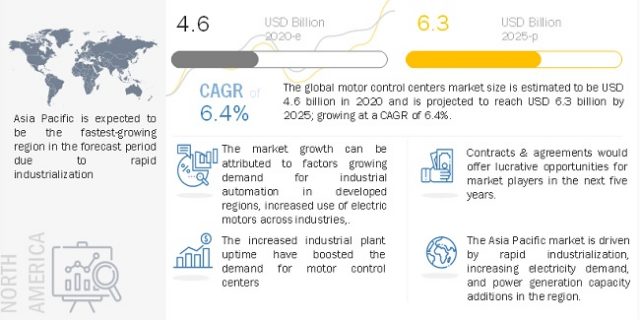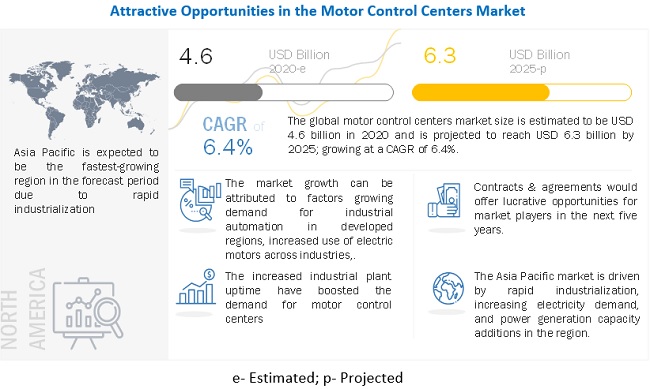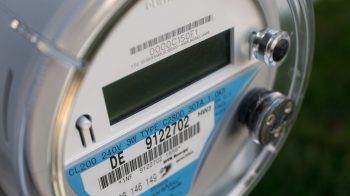
Global Motor Control Centers Market Scenario:
The global motor control centers market is expected to grow from an estimated size of USD 4.6 billion in 2020 to USD 6.3 billion by 2025, at a CAGR of 6.4% during the forecast period. The growing demand for industrial automation in developed regions and the increased use of electric motors are some of the factors driving the growth of the motor control centers market.
COVID-19 Impact on the Global Motor Control Centers Market:
The COVID-19 outbreak is profoundly affecting both the service and manufacturing sectors alike. With more and more countries resorting to nationwide lockdowns to prevent a further spike in the spread of the disease, the global economy has slowed down. In this context, the motor control centers market is expected to be affected in the short term owing to the shutting down of non-essential manufacturing sectors and other commercial sectors.
Key Market Players:
Rockwell Automation (US), ABB (Switzerland), Siemens (Germany), Schneider Electric (France), Eaton (Ireland), Fuji Electric (Japan), WEG (Brazil), Mitsubishi Electric (Japan), Larsen & Toubro (India), Vidhyut Electric (India), TES (UK), Rittal (Germany), Technical Controls (UK), Tesco Control (US), LSIS (South Korea), WEG (Brazil)
Download PDF Brochure @ https://www.marketsandmarkets.com/pdfdownloadNew.asp?id=227058918
With rising automation and technology upgrades in industries, the demand for smart devices, such as intelligent motor control centers, has increased. These intelligent devices have features such as faster response time, advanced diagnostics, precise control, and remote control and monitoring. Moreover, intelligent motor control centers minimize the number of components required, as many functions are integrated into a single intelligent device.

The use of such intelligent motor control centers leads to reduced downtime and higher efficiency, and it is mostly expected to decrease human intervention. Industries, such as oil & gas, water & wastewater, metal processing, cement, and food & beverage, have critical processes employing a large number of motors that demand precise control during operation. Intelligent motor control centers not only provide precise motor control but better protection and enhanced communication capabilities too. The current market trend is moving toward finding effective ways to increase integration between processes across industrial systems. Thus, the ongoing pursuit of such integration is expected to boost the growth of the motor control centers market.
Speak to Analyst @ https://www.marketsandmarkets.com/speaktoanalystNew.asp?id=227058918
The motor control centers market, by type, is segmented into conventional motor control centers and intelligent motor control centers. The conventional motor control centers segment accounted for the major share of the market in 2019. This growth can be attributed to the increasing levels of industrial automation in regions such as Asia Pacific and the Middle East & Africa. The use of intelligent motor control centers in process industries has resulted in the higher demand of intelligent motor control centers. Moreover, intelligent motor control centers offer more reliability, reduced wiring, greater speed and precision in defect identification, and are more compact compared to the conventional motor control centers. All these factors offer lucrative business opportunities in the intelligent motor control centers segment.
The motor control centers market, by voltage, is segmented into low voltage and medium voltage. The low voltage segment is expected to be the largest and fastest growing motor control centers market. Low voltage motor control centers are mainly used in industries such as chemical & petrochemical, cement & manufacturing, pulp & paper, food & beverage, and oil & gas to control the voltage, speed, torque, and frequency of motors, among other functions. The increasing use of motor control centers is these industries is likely to drive the low voltage motor control centers market.
The motor control centers market, on the basis of standard, has been categorized into International Electrotechnical Commission (IEC), National Electrical Manufacturers Association (NEMA), and others (Underwriters Laboratories (UL), Institute of Electrical and Electronics Engineers (IEEE), and the National Fire Protection Association (NFPA)). The IEC standard motor control centers have comparatively gained wider acceptance than the NEMA standard motor control centers across the globe owing to the major use of IEC standards in regions such as Asia Pacific, Europe, and the Middle East & Africa.
Request Sample Pages @ https://www.marketsandmarkets.com/requestsampleNew.asp?id=227058918
The circuit breakers & fuses segment is expected to be the fastest growing motor control centers market, by component, during the forecast period. The growth of the segment is influenced by the power T&D industry. The major applications of circuit breakers & fuses include construction activities, electronics and electrical equipment, and transportation equipment. With the growing concern for safety in electronic, electrical, and automotive equipment, the need for advanced fuses & circuit breakers in motor control centers is quite high. This is expected to create new revenue pockets for the motor control centers market during the forecast period.
Asia Pacific is estimated to be the largest motor control centers market during the forecast period. Increasing electricity demand and growing demand for industrial automation, coupled with numerous industrialization projects in the region, are driving the growth of the Asia Pacific motor control centers market.


